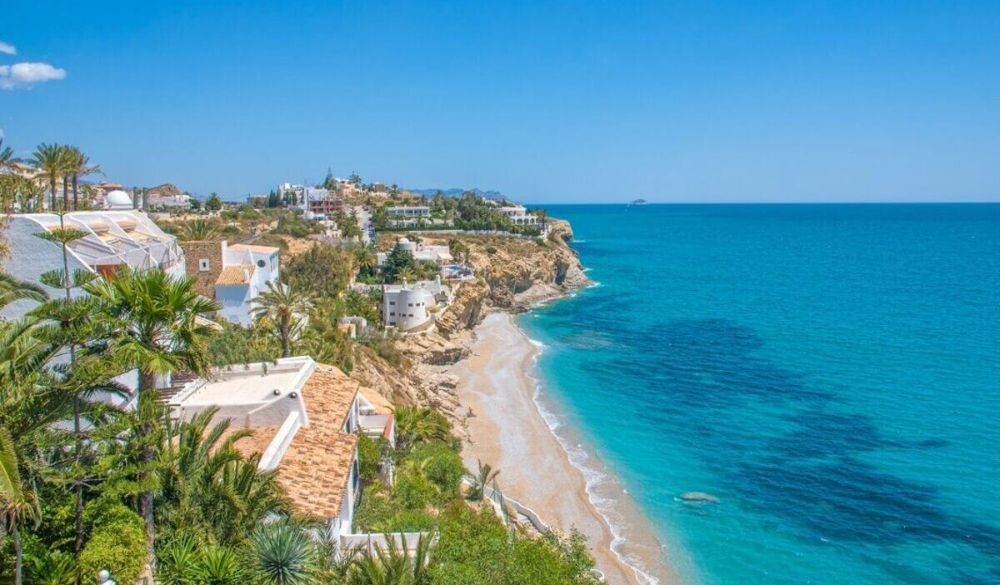A Guide to Buying Property in Spain for Foreigners

Dreaming of owning your own piece of Spanish paradise? Whether it’s a luxury villa on the sunny Costa del Sol or a trendy apartment in vibrant Barcelona, buying property in Spain as a foreigner is an exciting journey filled with opportunities. Did you know that in 2023, foreign buyers accounted for over 15% of property transactions in Spain? This statistic highlights the country’s allure for international investors and lifestyle seekers. In this guide, we’ll walk you through every aspect of buying property in Spain, from legal steps to financial planning and insider tips. Let's turn your dream into reality!
Why Buy Property in Spain?
1. Lifestyle Benefits
Spain is renowned for its exceptional quality of life. From the Mediterranean’s sun-soaked beaches to the picturesque countryside and bustling cities, Spain offers something for everyone. Residents enjoy over 300 days of sunshine annually in regions like the Costa del Sol and Valencia, promoting an active, outdoor lifestyle.
Spain's rich cultural tapestry, including flamenco dancing, historical architecture, and festivals like La Tomatina, is complemented by its world-class gastronomy. Tapas, paella, and fine wines create a culinary experience that attracts millions yearly. Furthermore, Spain’s healthcare system consistently ranks among the best globally, ensuring peace of mind for expatriates and retirees.
2. Investment Opportunities
Spain's real estate market offers diverse opportunities for both short-term gains and long-term wealth-building. Key areas such as Marbella, Barcelona, and Madrid consistently experience high demand, particularly for luxury properties and modern apartments. With tourism numbers returning to pre-pandemic levels, rental yields in vacation hotspots are on the rise.
Additionally, Spain’s property prices remain competitive compared to other European markets like France or Italy, making it an attractive destination for investors seeking high returns without exorbitant initial costs. The increasing focus on eco-friendly and energy-efficient properties adds a modern appeal to investment opportunities.
3. Popular Locations for Foreign Buyers
-
Costa del Sol: Known for its luxurious beachfront properties, golf courses, and vibrant nightlife, this region caters to affluent buyers looking for a combination of relaxation and sophistication. This guide on Best Areas for Property Investment in Costa del Sol provides you with an in-depth understanding of why Costa del Sol is an attractive investment destination.
-
Barcelona: This cosmopolitan city offers a mix of historic charm and modern living, with excellent rental potential due to its popularity among tourists and professionals.
-
Valencia: Ideal for those seeking affordability without compromising lifestyle quality, Valencia boasts a growing expat community, a booming culinary scene, and pristine beaches.
-
Madrid: Spain’s capital is a hub for business and culture, offering prime real estate options for those seeking urban living with high rental demand.
4. Market Trends in 2025
The Spanish property market is evolving, with a surge in demand for sustainable housing and properties equipped with modern technology. Solar energy installations, efficient insulation, and eco-conscious building materials are becoming selling points for many properties. Buyers are also seeking homes in areas with strong infrastructure and connectivity, such as easy access to international airports and high-speed rail systems. This guide on Costa del Sol Property Market Report: Trends and Predictions for 2025 offers you detailed insights into the latest trends and predictions for the Spanish property market, particularly in Costa del Sol, which complements the discussion on market trends for 2025 in the target article.
Legal Requirements for Foreigners Buying Property in Spain
1. NIE (Número de Identificación de Extranjero)
The NIE is a tax identification number required for any financial transaction in Spain, including purchasing property. It can be obtained by applying at a Spanish consulate in your home country or directly in Spain. The process typically involves submitting identification, proof of purpose (such as property purchase), and a small administrative fee.
2. Property Ownership Rights
Spain has no restrictions on foreign property ownership, allowing both EU and non-EU citizens to purchase homes freely. However, buyers should ensure the property is registered with the Land Registry (Registro de la Propiedad) to confirm its legal status and ownership history.
3. Hiring a Local Solicitor (Abogado)
A reputable solicitor is invaluable for navigating Spain’s legal system. They will conduct due diligence, including verifying property deeds, checking for existing debts or liens, and ensuring compliance with zoning laws. Lawyers also facilitate the contract signing and help negotiate favorable terms.
Steps to Buying Property in Spain
1. Research and Location Selection
Begin by identifying your goals: Are you seeking a vacation home, a rental investment, or a permanent residence? Research the property market in your chosen region and compare prices, amenities, and local infrastructure. Assetfolio, a leading estate agency specialising in Marbella and Costa del Sol, offers bespoke recommendations tailored to your needs.
2. Making an Offer
Once you find the ideal property, submit a formal offer. This often involves negotiating the price and terms. Upon agreement, both parties sign a reservation agreement, usually requiring a deposit to secure the property.
3. Finalising the Purchase
The purchase process culminates with the Escritura Pública, or public deed, signed in the presence of a notary. The notary ensures the transaction is legal and registers the property in your name. Upon completion, the property is officially yours, and registration with the local Land Registry follows.
Costs and Taxes Associated with Buying Property in Spain
1. One-Time Costs
-
Purchase Price: This is the negotiated amount agreed upon with the seller.
-
Legal Fees: Typically range from 1-2% of the purchase price and cover the solicitor and notary services.
-
Taxes:
-
Transfer Tax (ITP): For resale properties, this varies by region but generally ranges between 6-10%.
-
VAT: New builds incur a 10% VAT charge.
-
Stamp Duty: Approximately 1.5% of the property’s value.
-
2. Ongoing Costs
-
IBI (Property Tax): An annual tax calculated based on the cadastral value of the property.
-
Community Fees: For properties in developments with shared amenities like pools or gardens.
-
Maintenance Costs: Routine upkeep, repairs, and utility bills are essential considerations.
3. Hidden Costs to Watch For
Ensure your budget accounts for potential hidden costs, such as mortgage arrangement fees, property surveys, or valuation reports. Engaging an experienced real estate agency like Assetfolio minimises surprises.
Financing Your Purchase as a Foreigner
Buying property in Spain as a foreigner often involves navigating unique financial and currency considerations. Proper preparation and professional assistance are key to ensuring a smooth process.
1. Spanish Mortgages for Non-Residents
Spain offers competitive mortgage options for non-residents, typically financing up to 60-70% of the property’s assessed value. The terms may vary depending on the bank, your financial profile, and the property type. Interest rates for non-resident mortgages are usually slightly higher than those for residents, but they remain attractive for international buyers. Fixed-rate and variable-rate options are available, giving buyers flexibility in managing repayments.
Some popular Spanish banks, such as Santander, BBVA, and CaixaBank, cater specifically to foreign buyers, offering tailored mortgage solutions and English-speaking staff to facilitate the process.
2. Required Documents
To secure a mortgage, foreign buyers need to provide a comprehensive set of documents, including:
-
Proof of Income: Recent pay slips, tax returns, or other evidence of financial stability.
-
Credit History: A report from your home country demonstrating your creditworthiness.
-
Property Valuation Report: Banks typically require an official valuation of the property to determine the loan amount.
-
NIE (Número de Identificación de Extranjero): Essential for all financial transactions in Spain.
-
Bank Statements: Typically covering the past 3-6 months to show your financial behavior.
Having these documents ready speeds up the application process and increases the chances of approval.
3. Currency Exchange Tips
Fluctuations in exchange rates can significantly impact the final cost of your property. Working with currency exchange specialists allows you to lock in favorable rates, helping you save money and reduce risks associated with currency volatility. Consider using forward contracts or setting up regular payment plans for ongoing costs, such as mortgage repayments or property maintenance. This guide on A Guide for Americans Buying Property in Spain provides you with a tailored guide for Americans considering property investments in Spain, making it an excellent resource for understanding currency exchange and related financial tips.
Common Pitfalls and How to Avoid Them
Buying property in a foreign country comes with challenges, but knowing the potential pitfalls can help you avoid costly mistakes.
1. Hidden Costs
Property transactions in Spain involve several additional costs, such as taxes, notary fees, and maintenance expenses. To avoid surprises, work with transparent agents like Assetfolio, who provide detailed breakdowns of all associated costs upfront.
2. Legal Risks
Ensure the property is free from liens, debts, or unresolved ownership disputes by verifying the land registry details. Hiring a qualified lawyer with expertise in Spanish property law is crucial to safeguarding your investment.
3. Fraud Prevention
Unfortunately, real estate fraud is not uncommon in global markets. To protect yourself:
-
Always verify the credentials of the agents and solicitors you work with.
-
Avoid cash transactions or deals that seem “too good to be true.”
-
Use licensed professionals, like those at Assetfolio, who adhere to strict regulatory standards.
Living in Spain: What to Know After Buying
Owning property in Spain is the first step toward a fulfilling lifestyle or profitable investment. Here's what you need to know after purchasing your dream home.
1. Residency Through Property Investment
Spain’s Golden Visa program offers residency to non-EU buyers who invest €500,000 or more in real estate. Benefits include:
-
Freedom to travel within the Schengen Zone.
-
Residency for immediate family members.
-
Potential for permanent residency or citizenship after maintaining your investment.
This program makes Spain an attractive destination for investors seeking both property ownership and European residency benefits. This guide on Financing Property Purchases in Spain for US Citizens helps you navigate the financial aspects of property investment, particularly for those interested in residency programs like the Golden Visa. It ensures you are prepared for the financial requirements of purchasing high-value properties.
2. Embracing the Culture
Spain’s welcoming culture is a significant draw for foreigners. Learning Spanish, even at a basic level, enhances your ability to connect with locals and immerse yourself in the country’s rich traditions. Engage in local festivals, sample regional cuisines, and explore historical landmarks to enrich your experience.
3. Managing Your Property
Whether you’re living in Spain part-time or renting out your property, professional management services are invaluable. They can handle:
-
Tenant screening and rental agreements.
-
Property maintenance and repairs.
-
Ensuring your property complies with local rental laws and tax requirements.
Why Choose Assetfolio?
When buying property in Spain, partnering with the right real estate agency is crucial. Assetfolio is a trusted name in the Costa del Sol region, offering unparalleled expertise and a personalised approach.
1. Unmatched Local Expertise
Assetfolio has a deep understanding of the Costa del Sol’s luxury real estate market, from Marbella’s glamorous beachfronts to serene hillside retreats. Their team offers insider knowledge, ensuring buyers access the finest properties tailored to their preferences.
2. Proven Track Record
With a portfolio of high-value transactions and glowing testimonials from international clients, Assetfolio has earned its reputation as a reliable partner in real estate. They excel at delivering results, whether you’re looking for a second home, investment property, or a dream villa.
3. Personalised Service
Every client’s journey is unique. Assetfolio provides end-to-end guidance, from helping you identify your ideal property to managing post-purchase needs. Their team takes the time to understand your goals, ensuring a seamless and stress-free experience.
4. Cutting-Edge Technology
Stay ahead with Assetfolio’s advanced tools, including virtual tours, 3D property models, and real-time market insights. These features save time and make exploring properties from anywhere in the world effortless.
5. Comprehensive Support
From handling legal requirements to offering financial advice, Assetfolio’s holistic approach ensures you’re supported at every stage. Their multilingual team bridges communication gaps, making the process smooth and efficient for international buyers.
FAQ Section
Q: Can foreigners buy property in Spain?
A: Yes, Spain welcomes foreign buyers with no restrictions on ownership.
Q: What is the Golden Visa, and how does it work?
A: The Golden Visa grants residency to non-EU buyers investing €500,000+ in Spanish property.
Q: Should I hire a lawyer when buying property in Spain?
A: Absolutely. A lawyer ensures all aspects of the transaction are legally sound.
Conclusion
Owning property in Spain is more than an investment—it’s a gateway to a vibrant lifestyle and a smart financial move. By understanding the steps, costs, and potential challenges, you can navigate the process confidently. Ready to take the leap? Assetfolio is here to guide you every step of the way.
Visit Assetfolio.com to start your journey toward owning your dream property in Spain today!
Popular posts






